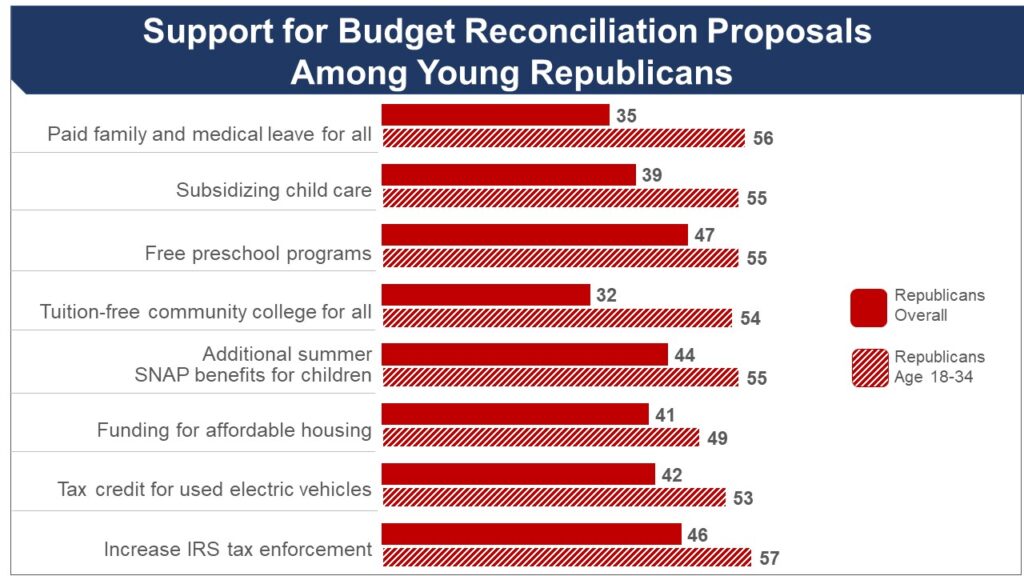
ISSUE #3 – October 2021
Public Views of 33 Reconciliation Budget Proposals
The Program for Public Consultation (PPC) at the University of Maryland has conducted a comprehensive analysis of surveys on 33 major proposals in the proposed reconciliation budget, what has been called “The Largest Piece of Legislation in History.” Seventeen of the provisions were evaluated in PPC surveys. PPC also did a comprehensive review of polls from other organizations. All 33 provisions receive majority support, in most cases from large majorities of the American public. For every proposal, this includes majorities of Democrats and independents.
Among Republicans, majorities support 18 of the proposals and pluralities support another three, while for only five of the proposals is a majority opposed. On two proposals, their views are roughly divided, and for one, a plurality is opposed. For four, Republican views vary according to how the proposal is presented
Among the proposals to receive bipartisan support, the largest number are in the issue areas of health care and the environment. More than half of the provisions were tested using PPC’s in-depth survey method that provides thousands of respondents with briefings on policy proposals and expert-reviewed pro and con arguments before recommendations are made.
As lawmakers make hard-pressed decisions about cutting the cost of the reconciliation budget, an analysis of public opinion on which provisions have the broadest support from voters should be a useful roadmap for finalizing the final contours of the bill. Public support can offer a powerful political rationale for tough votes by politicians from swing states and districts.
Clearly, there is far more common ground in the public than there is in Congress. If leaders in Congress turn to the American people to act as a voice of reason, it will give them direction on where to find common ground, within both parties.

Young Republican Voters’ Views on Budget Reconciliation Proposals
An analysis of different age groups was conducted on provisions of the reconciliation package when the data was available. Among Republicans aged 18-34, support for the budget reconciliation proposals was substantially higher than for Republicans in general. A majority or large plurality of Republicans aged 18-34 were in favor of at least eight of the proposals that do not have majority Republican support overall. These include: paid family and medical leave for all, subsidizing childcare, free preschool programs, tuition-free community college, additional SNAP benefits for children during the summer, increasing funding for affordable housing, tax credits for used electric cars, and bolstering the IRS’s tax enforcement. For the other six proposals without majority Republican support, the data on younger Republicans is not available.

Nuclear Guardrails on President Garner Public Support
Check out the new op-ed in the Baltimore Sun about public support for legislation that would reform the president’s authority to begin a nuclear war, written by Nancy Gallagher, Director of the Center for International and Security Studies at UMD, and Steven Kull, President of Voice of the People. Under law, the president has sole authority to order a nuclear launch for any reason, but legislation in the House and Senate’s Foreign Relations committees would prevent any president from launching a nuclear strike first, without a declaration of war from Congress.

Citizen Assembly in Oregon addresses path back to normalcy after Covid-19
Oregon’s first-ever Citizen Assembly took place over the summer to lay out core principles and policy recommendations for how the state should begin to re-open after the long period of pandemic lockdowns. The Assembly consisted of 40 participants, representative of the state’s demographics and partisan makeup, were randomly recruited by Portland State University’s National Policy Consensus Center and the non-profit Healthy Democracy. Over the course of several weeks, the citizens deliberated on a series of questions and policy recommendations submitted by a bipartisan group of Oregon’s state legislature.
In the end, the Citizen Assembly issued a report which included core principles for the state legislature to follow, and policy recommendations pertaining to housing and education, all in regards to a Covid-19 recovery.
Four recommendations were agreed to by at least two thirds of the Assembly, each which included a set of policy proposals. For example, 79% favored, “programs to keep people in safe and secure homes,” such as an eviction moratorium and making state payments directly to landlords to prevent evictions. Regarding education policy, 78% favored making internet access and the relevant technology available to all students so they could successfully attend school from home as long as is needed.
Finally, the Assembly presented and discussed their findings with members of the Oregon State Legislature, who have pledged to incorporate the Assembly’s recommendations into their legislation.

Paid Family & Medical Leave
Policymaking Simulation: Put yourself in the shoes of policymakers by trying our policymaking simulation on paid family and medical leave legislation in front of Congress. In this simulation, we will introduce the proposal in front of Congress that would guarantee up to 12 weeks of family or medical leave per year for all workers and cover the cost of two thirds of workers’ earnings during that period. Once you finish the simulation, you’ll have a chance to send your recommendation to your Congresspeople.

Voice of the People has identified nearly 180 positions on which Democrats and Republicans agree. Find out more at www.vop.org/common-ground.
